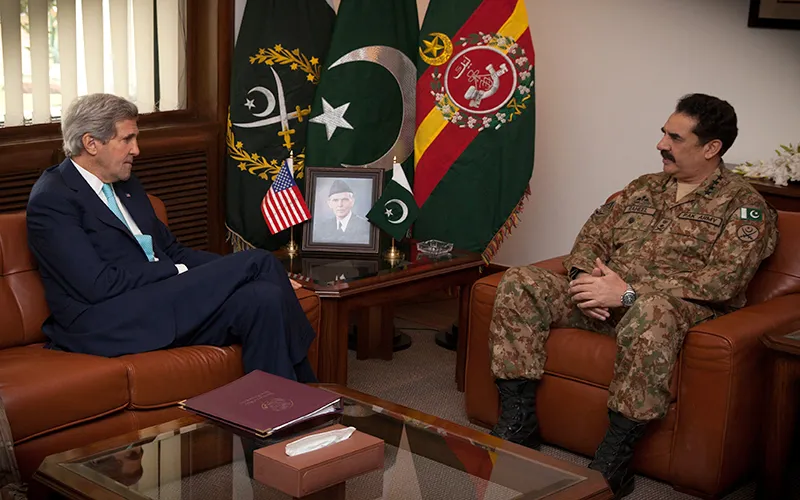Nawaz Sharif's low-key visit to the US is over. Now the really meaningful visit would be that of General Raheel Sharif, for he not only has the battalions with him, he has the ISI, through which he exercises control on terrorist groups operating in the neighbourhood. A retired general is now the country's National Security Advisor, replacing Sartaj Aziz. One more retired general is in charge of the Strategic Plans Division. The official spokesperson on security and important issues is a serving general. Finally, the real Cabinet in Pakistan comprises the Corps Commanders. And together, serving and retired generals run a large corporate empire in the country. The important personalities he meets, or organisations that host him, the entourage that accompanies him, the military establishments the general visits will be an indication of the importance that the US will give to this new soldier-statesman from Pakistan.
Traditionally, US administrations have preferred to deal with such soldier-statesmen that Pakistan has produced with regular periodicity. They provided single-window facilities to deal effectively with American strategic objectives in the region unlike the cumbersome democracy next door. Ayub Khan and Yahya Khan were the first two to help in the Cold War. Muhammad Zia ul-Haq and Pervez Musharraf were pariahs in the beginning of their careers as dictators, but circumstances transformed them into stalwart allies. However, both the Generals pursued their own agenda and constantly deceived the Americans. Ashfaq Parvez Kayani remained busy warding off the snakes he had raised.
General Sharif has seemingly controlled terror emanating from FATA (Federally Administered Tribal Areas), has restored the image of the Army after the setbacks during the time of his predecessors Musharraf and Kayani, and has prevented Nawaz's tribal vendetta against Musharraf. He runs a quasi-independent judicial system. Besides, Raheel Sharif's strong arm methods in Karachi and Balochistan may have earned him respect from the army ranks.
Raheel Sharif's visit will be taking place in the context of a few crucial developments. After 14 years of war on terror led by the mightiest power on earth, the Taliban, backed by Pakistan, are on the ascendent again and the American/NATO venture has collapsed with little chance of recouping losses. This result was foretold by many and as Richard Holbrooke once commented, the US might have been fighting the wrong enemy in the wrong country. Moreover, there was never any US reprisal for repeated Pakistani deception. Instead, Pakistan usually got generously rewarded with funds and weapons systems, including weapons that would help it to fight India.
Second, the US needs Pakistan now as it wants to leave Afghanistan, where Pakistani terrorist networks like the Haqqanis and the Lashkar-e-Tayyaba remain intact.
Third, the US and the West have had military and strategic setbacks in West Asia. At this stage, the US does not wish to see a Pakistan that is not viable or not under some sort of US tutelage. It overlooks that all these years, barring the first few into the war in terror, it is Pakistan that has successfully run its agenda and subsumed the American agenda.
Fourth, a change of narrative about Pakistan had become necessary, which would essentially allow the US sufficient reason to repeat the mistakes with Pakistan as in the past. Sameer Lalwani's astonishing essay earlier this year said that Pakistan had made, what he called without evidence, a "shocking strategic shift". Professor Christine Fair's forceful rejoinder backed by facts, one hopes, would have ground this assessment into dust. An analysis about Pakistan's amazing economic recovery read like an ISPR handout while another helpfully speculated a war between India and Pakistan, raising the inevitable nuclear question.
Finally, one got to read the truly amazing assessment from Michael Krepon and Toby Dalton suggesting that the best way to deal with Pakistan would be to give that country a nuclear deal similar to the US-India Civil Nuclear Agreement and admit it to NSG on par with India. This will be a retrograde step in nuclear proliferation terms of equating a proliferator with a non-proliferator. Krepon is no rookie in the game and his views are considered seriously. Earlier, Carnegie/Stimson had published a paper recommending that nuclear Pakistan should be mainstreamed.
This may seem blindly pro-Pakistan to many, but is essentially a throwback to the old US dictum of balance of powers not between US and other powers but between other powers themselves so that no regional power will be strong enough to threaten US supremacy or interests. "Rebalancing" or "pivots" are different terminologies, the aim is the same — keeping control.
(The writer is a former chief of Research and Analysis Wing and currently Advisor to Observer Research Foundation, Delhi)
Courtesy: www.mid-day.com
The views expressed above belong to the author(s). ORF research and analyses now available on Telegram! Click here to access our curated content — blogs, longforms and interviews.




 PREV
PREV



